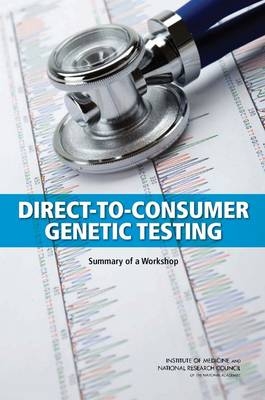
Direct-To-Consumer Genetic Testing
National Academies Press (Verlag)
978-0-309-16216-6 (ISBN)
- Titel z.Zt. nicht lieferbar
- Versandkostenfrei innerhalb Deutschlands
- Auch auf Rechnung
- Verfügbarkeit in der Filiale vor Ort prüfen
- Artikel merken
While this research is by no means a straight path toward better public health, improved knowledge of the genetic linkages has the potential to change fundamentally the way health professionals and public health practitioners approach the prevention and treatment of disease. Realizing this potential will require greater sophistication in the interpretation of genetic tests, new training for physicians and other diagnosticians, and new approaches to communicating findings to the public. As this rapidly growing field matures, all of these questions require attention from a variety of perspectives. To discuss some of the foregoing issues, several units of the National Academies held a workshop on August 31 and September 1, 2009, to bring together a still-developing community of professionals from a variety of relevant disciplines, to educate the public and policy-makers about this emerging field, and to identify issues for future study.
The meeting featured several invited presentations and discussions on the many technical, legal, policy, and ethical questions that such DTC testing raises, including: (1) overview of the current state of knowledge and the future research trajectory; (2) shared genes and emerging issues in privacy; (3) the regulatory framework; and (4) education of the public and the medical community.
1 Front Matter; 2 Introduction; 3 Scientific Foundations for Direct-to-Consumer Genetic Testing; 4 Personal and Social Issues; 5 Research and Medical Issues; 6 Impact on Health Care and Public Health; 7 Current Legislative and Regulatory Framework in the United States; 8 Areas for Further Study; 9 Appendixes; 10 Appendix A: Glossary Of Terms And Acronyms; 11 Appendix B: Regulation of Direct-to-Consumer Genetic Testing Outside the United States; 12 Appendix C: Currently Available Direct-to-Consumer Genetic Tests; 13 Appendix D: Representative Direct-to-Consumer Genetic Testing Companies; 14 Appendix E: Planning Group Biographies; 15 Appendix F: Workshop Agenda; 16 Appendix G: Workshop Participants; 17 Appendix H: Membership of Oversight Boards and Committees
| Erscheint lt. Verlag | 16.1.2011 |
|---|---|
| Verlagsort | Washington |
| Sprache | englisch |
| Maße | 152 x 229 mm |
| Themenwelt | Naturwissenschaften ► Biologie |
| ISBN-10 | 0-309-16216-5 / 0309162165 |
| ISBN-13 | 978-0-309-16216-6 / 9780309162166 |
| Zustand | Neuware |
| Haben Sie eine Frage zum Produkt? |
aus dem Bereich


